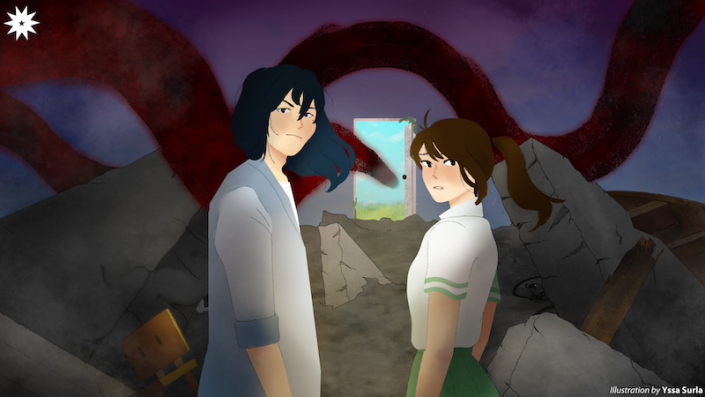Disasters are senseless tragedies. At any moment, while all may seem normal, the rapid force of wrath could thrash and crumble our reality. In its wake, it only leaves death, ruin, and witnesses who carry nothing but the weight of traumatic grief and the burden of comprehending the absurd. There never really is an easy way to move on from calamity. But Suzume, the latest film from Japanese director Makoto Shinkai, offers us a path forward.

Across Japan, the immense threat of devastation looms. In abandoned places, magical gateways open, allowing a colossal creature to emerge and shatter the earth and lay waste to entire cities. High school junior Suzume Iwato abruptly leaves her quiet town life and journeys across the country, as she thrusts herself into a mission to seal off the gates and save millions of lives. A blend of fantasy, action, and adventure, Suzume is an exciting road movie that illustrates persistence and tender acceptance.
Suzume’s departure
Shinkai’s prowess had always lain in his portrayal of the epic in the mundane. Whether it’s about an intergalactic war, an underground legendary kingdom, or the power to control nature, it was the simple moments and intimate dialogue of the characters that garnered the audience’s rapt attention. Yet in a fully captivating and brilliant 122 minutes, Suzume shows us myth and emotion in grand proportions—an amusing departure from what most people might have come to expect from its director.
The most obvious shift is that it strays from the hopeless-romantic tale that made previous blockbusters Your Name and Weathering with You so iconic. It retains the director’s trademark narrative of a blossoming youthful romance trying to defy whatever keeps the partners apart. But all that has become incidental. In Suzume, the romantic arc has a very un-Shinkai-like hasty development. Yet that should not be a surprise: after all, the film keeps the love story to the sidelines and instead highlights the protagonist’s literal and figurative journey.
Prominent too is the change in genre. The movie fully embraces an outwardly fantasy nature, which only used to be in the periphery of most of Shinkai’s past projects. Though at the cost of not providing depth to its mythos, it realizes its ambitious vision, creating the footing for an enjoyable experience, along with its action and adventure components. In all, it presents a novel tenor, bringing more majestic awe to the fore while maintaining personal solemness in a way that only the famed filmmaker can.
Sky over Tokyo
Even just on the surface, Suzume is capable of holding the average watcher’s attention. Its production design gives life to enchanting environments and enthralling events that the audience cannot help but be mesmerized by.
Making the most of its road movie genre, it flexes the animators’ versatility in depicting all sorts of settings across Japan and its eye-catching landscapes. Neither does the artistry shy away from the harsh reality of devastating catastrophes, with an attention to detail that creates a striking juxtaposition of the before, during, and after.
Add to that the near-perfect score supplied by Japanese composer Kazuma Jinnouchi and rock band Radwimps, with the latter also responsible for the award-winning music in Your Name and Weathering with You. By itself, the soundtrack is a stimulating piece of work—but when layered on the film, it amplifies its vividness.
And nowhere is this technical mastery flaunted more boldly than in the Tokyo sequence. There, we see the frightening scale of imminent ruin in its full extent and with an imprinting gravitas. It is where the movie ingrains in us the impression that great havoc can befall anyone at any time without warning. To achieve that effect, it depicts the looming arrival of such an insurmountable and devastating force using imagery that is nothing short of brilliant.
Altogether, these allow the movie to live up to its action-adventure label and produce stunning scenes that can only entrap an audience, culminating in an aggressive alternate dimension face-off, where the stakes will have been etched in our minds.
Closing the door
But what really makes a Shinkai film is its brand: it is a reflection of the normal struggles underlying our humanity, regardless of how much larger than life our escapades are. And Suzume presents this in several ways.
At the same time, it runs the risk of attempting to cover too many bases, as it deals with the melancholy of abandoned places, the restrained emotions between family members, the nature of death, and the longing for the presence of the departed. Its breadth allows it to scatter multiple touching moments across the story, but it also sometimes leaves the characterization somewhat unrefined such that even the sacrifice made by certain characters is difficult to appreciate.
Nevertheless, the film does convey its many themes as properly as it can. Most importantly, it certainly gives complete thought to its emotional centerpiece—the inevitable and all-encompassing grief following a major disaster. Suzume herself embodies this distress: at the age of four, she lost her mother to the 2011 Tōhoku earthquake and tsunami and had never really overcome her sorrow. It is a portrayal that is all too familiar to Filipino audiences, who face disasters every so often and are still recovering from a recent global one.
Suzume gives us the key to our recourse. Her mission of closing doors is quite literally an act of closure. Suzume’s journey and the conclusion to her inner conflict show us that only we can give ourselves the healing we may spend years looking for and that only we can give ourselves hope for our tomorrow.
It is this earnest human insight wrapped in the allure of sublime storytelling and fantastic filmmaking that gives Shinkai’s work its character. His latest feature is quickly and rightfully making itself known as one of his best, giving us every reason to hold Suzume dear.
